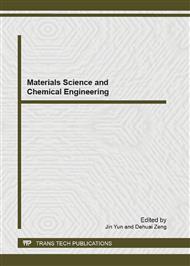p.349
p.354
p.360
p.367
p.371
p.378
p.383
p.387
p.392
Multiple-Instrument Analysis and their Relationship with Process Development
Abstract:
The waste polymer-polyethylene (PE) was treated in a supercritical water (SCW) system under different operation conditions (such as temperature, heat rate and ratio of water and PE material). The obtained liquid oil products and solid-products were analyzed by conjunct methods including high performance gel penetration chromatography (GPC), Fourier transform infrared spectroscopy (FTIR) and gas chromatography (GC). A relationship of the characteristics of the products and the operation conditions in waste treatment was established. The results of FTIR and GC analyses indicated that the liquid oil products contain a large amount of alkanes, which are suitable for using as fuel oil. Through a series of experiments, the optimum operation conditions were defined as follows:The amount of PE sample: 6g, H2O/PE ratio: 6/1, the reaction temperature (Tem): 460° C, heating rate (Vt): 7.66 (°C / second), the yield of products: 86.0%.
Info:
Periodical:
Pages:
371-377
DOI:
Citation:
Online since:
May 2013
Authors:
Keywords:
Price:
Сopyright:
© 2013 Trans Tech Publications Ltd. All Rights Reserved
Share:
Citation:


